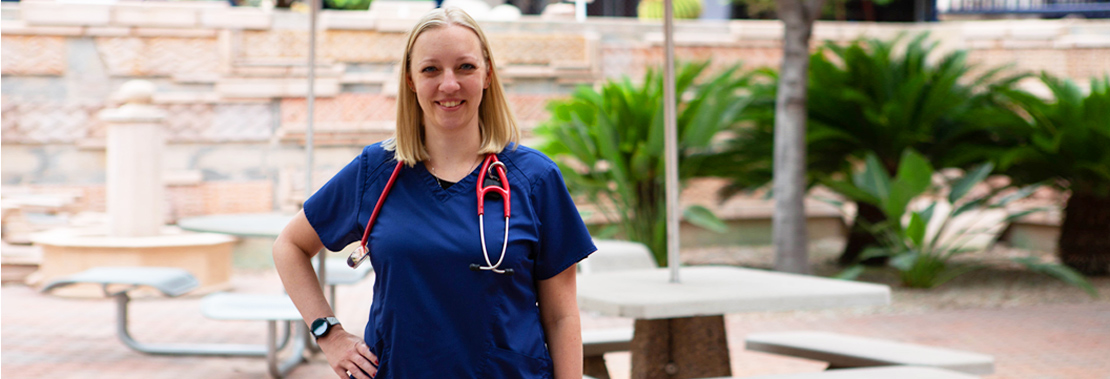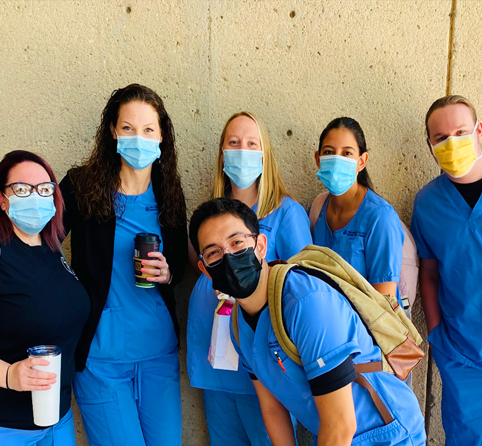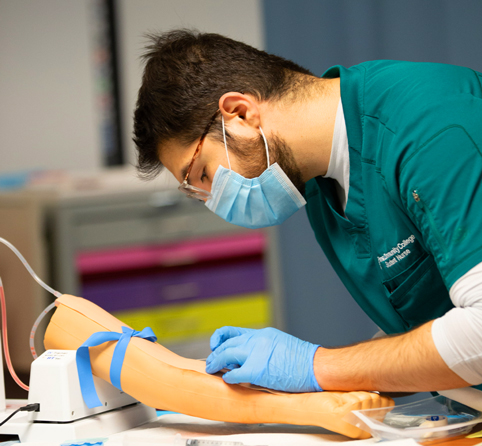
From the Classroom to the Frontlines
Over the last 18 months, Pima nursing faculty transformed their program to put students and the community first.
In March 2020, Pima’s nursing program faced a crossroads. Like the rest of the world, the nursing faculty were grappling with the COVID-19 pandemic and how to support students when the world had gone virtual overnight.
As both educators and essential workers, nursing faculty knew they had to come up with creative solutions to serve both students and the public during this challenging time.
Before the pandemic, the nursing program offered 100% in-person instruction. Moving the program was a daunting task as community partners stopped offering clinical opportunities for students due to safety concerns. Faculty were also unsure how they would replicate the important in-person training nursing students undergo in a completely online setting.
While the changes the pandemic posed were daunting, Pima’s nursing instructors were up to the challenge. They made program changes that prioritized student learning and served the community as essential workers.
Adapting the Nursing Program to COVID-19
As faculty developed ideas to move instruction online, they realized the program not only had the opportunity to keep students safe by making the transition to virtual learning, but to completely reimagine how students learned and met program objectives.

Nursing instructors embraced the flipped classroom approach.
In a traditional classroom, students learn new content for the first time during class then are assigned homework to practice the new information on their own time.
While this model of learning is familiar, it doesn’t always have the students’ best learning interests in mind. Students can feel isolated during their homework assignments without the support of their peers or instructors to help put their learning into practice. And, homework can be a high-stress activity where students feel pressured to master content on their own, rather than with the support of peers and instructors.
In a flipped classroom, students are assigned activities before class that introduce new course content. Then, in class, they put that knowledge into practice through activities, debates and group discussions.
Flipped classrooms are about more than simply switching the order of learning. Effective flipped classrooms open up class time to prioritize hands-on, attentive learning activities. In other words, the flipped classroom approach pays attention to students’ learning needs and fosters interaction in the classroom.
While switching teaching styles was a scary thought before the pandemic, the pace at which the world changed under COVID-19 inspired the nursing faculty to make bold changes. “We said to ourselves, ‘We have to change, so we might as well jump in. Be brave and really go for it,’” said nursing instructor, Jeanine Maine.
The change seems to be working. “Despite how challenging it’s been for faculty and students, we’ve seen a 7% increase in state board exam scores,” Maine noted.
While faculty is excited to get back to more in person learning this Fall, the flipped classroom approach is here to stay. Faculty hope the approach will continue to be a source of support for students undergoing the difficult training process of becoming a nurse.
“The Pima nursing program attracts students who want to become a part of a close knit community.”
Pima’s nursing program is a limited admissions program that prepares you directly for work in the community. Pima also offers affordable concurrent enrollment programs where students can continue on to a BA or MA in Nursing at the University of Arizona, Arizona State University or Northern Arizona University.
Maine affirmed how difficult the program can be, but wanted to let students know the effort pays off: “It is rigorous. The program takes a lot of time and dedication but it will be worth all the blood, sweat and tears. Know it’s worth the uphill battle.”
Pima Nurses Serve the Tucson Community
Students were not the only priorities for nursing faculty during the pandemic. In addition to teaching in Pima’s nursing program, faculty members worked full-time as nurses in the community, supporting COVID-19 patients and helping administer vaccines.
The opportunity to partner with Banner Health to administer vaccines to the community also provided an invaluable learning opportunity for students. Many students were unable to complete traditional clinical training due to pandemic restrictions, so administering vaccines became an opportunity for students to learn patient treatment, intake and aftercare.
Maine estimates Pima students and faculty administered over 70,000 vaccine doses during the Spring 2021 semester.

“The Pima nursing program attracts students who want to become a part of a close knit community,” Maine shared.
The vast majority of Pima nursing students stay in Tucson after they graduate, which means the program is not only a rigorous training program but also a vital pipeline of health professionals who are committed to serving the Tucson community.
Maine is no exception to this pipeline. A Tucson native, Maine knew she wanted to be a nurse at 4 years old. She is a graduate of Pima’s nursing program and returned to the College as an instructor in addition to working as a nurse.
“Some things never change. When I graduated high school, my mom asked me what I wanted to do and I said nursing, same as what I said when I was a child,” Maine said.
She also knows this experience will pay off in the classroom. “Students want professional relevance in the classroom. They want to know their instructors understand the work we are asking them to do,” Maine said.
Although the last 18 months have been difficult, Maine knows there is still much to be grateful for. After it all, Maine is most proud of how faculty transformed the nursing program to put students’ learning needs first while working full-time as essential workers to care for our community during the pandemic.
Get Involved at Pima
While Pima students, faculty and staff must continue to take precautions to keep our community safe, Fall semester brings more in-person class options and support services.
Student clubs are also welcoming new and returning students back to campus. Getting involved in a club or activity can be your first step toward building community here at the College— both in-person and virtually.
Now, Pima has a one-stop hub where you can explore student clubs and upcoming events. PimaEngage is the College's new online platform that hosts all information about student activities on campus.
Learn how you can use PimaEngage to find the student activity that's right for you. Get Involved